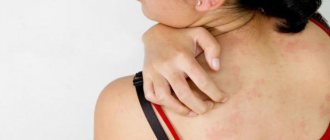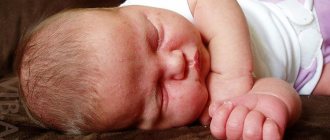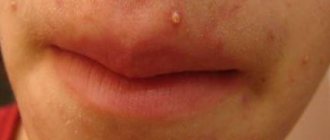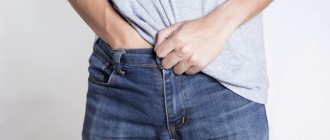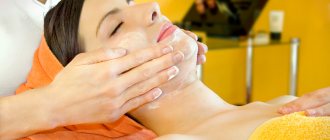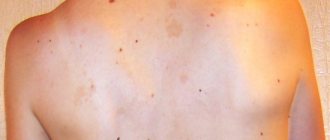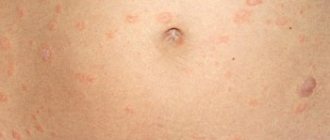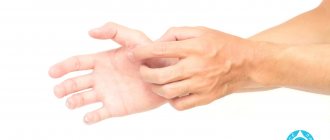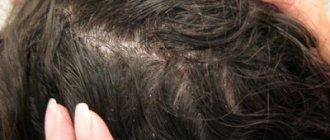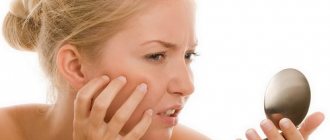Itchy skin is a symptom of many dermatological diseases and often causes unbearable suffering to a person, depriving them of peace and sleep. In most cases, the skin turns red, becomes covered in a rash, and peels off. Sometimes unbearable and obsessive itching all over the body is not accompanied by any of the listed symptoms. Let's try to figure out why itching occurs without rashes and how to get rid of this problem.
Types of itching
According to the scale of manifestations, skin itching is divided into the following types:
- Localized. In this case, only one place itches, for example, the scalp, anal area, elbow bends, perineum, and other parts of the body.
- Generalized. This is a more serious health threat. Characterized by itching all over the body at once. It can cause diseases of internal organs, tumors, hormonal imbalances, allergies, and mental disorders.
Note! The regularity of itching is also of great importance, because when the whole body constantly itches, additional unpleasant symptoms arise: insomnia, increased skin sensitivity, irritability.
Diagnostics
Itching without a rash can be a symptom of many serious illnesses that require immediate treatment. Before you start taking medications and undergoing procedures, you need to accurately determine the cause that caused the itching.
It is necessary to make an appointment with a dermatologist who will conduct a thorough examination. If there are no skin pathologies, the doctor will refer you for consultation to other specialists - a therapist, gastroenterologist, endocrinologist, allergist, urologist, gynecologist or neurologist.
The patient will need to undergo laboratory tests, undergo an ultrasound of internal organs, computed tomography and other types of studies. Only after doctors have reconstructed the full picture of the disease can we talk about prescribing treatment procedures.
Temporary external causes of itching
The body can itch in different ways: severely or moderately, all the time or periodically. External factors that can provoke causeless itching include:
- Too dry skin. When the water balance in the body is disturbed, this is reflected in the condition of the skin. It becomes faded and begins to peel off. Lack of moisture causes itching throughout the body.
- Seasonal itching. Each season brings its own discomfort: in summer the body itches from exposure to ultraviolet rays, in winter, autumn and spring the body lacks vitamins.
- Age-related changes. This itching is called senile in medicine. In older people, the epidermis loses its elasticity and becomes dry.
- Reaction to taking certain medications. Individual intolerance to certain medications affects the skin. This usually applies to drugs from the following groups: antibiotics, steroids, hormonal drugs.
- Pregnancy. While carrying a child, the female body undergoes changes, the skin loses its elasticity, which causes itching. Typically problem areas are localized in the lower back, chest, and abdomen.
- Stressful state. As a result of nervous tension and anxiety, itching may occur throughout the body.
Senile itching
The best ways to get rid of itching from psoriasis
This diagnosis is often given to people over 65 years of age. It has been observed that men are more likely to experience age-related itching than women. Initially, one area itches, and then spreads to the entire body, becoming generalized. Unpleasant sensations appear in the late afternoon and disturb the person throughout the night.
If we exclude the presence of skin or internal diseases, then the cause of senile itching should be sought in age-related changes in the body. In older people, drying and thinning of the epidermis, disruption of keratinization processes, degeneration of nerve endings, and atherosclerosis of the vessels supplying the skin with blood are observed.
To eliminate this unpleasant symptom, it is enough to moisturize the skin well, using special nourishing creams intended for older people. To improve sleep, you can take soothing teas or tinctures of medicinal herbs - motherwort, valerian, mint, lemon balm.
Diseases accompanied by itching of the body skin without rashes
Important! Diseases that are accompanied by itching without rashes require immediate diagnosis and subsequent treatment.
The body can itch as a result of the development of such pathologies:
- Neurodermatitis. A chronic disease that affects the nervous and immune systems due to allergies.
- Xerosis. Increased dryness of the epidermis. The reasons for the appearance may be different: genetic predisposition, frequent contact with harmful substances, lack of hygiene.
- Diabetes. An increase in blood sugar is sometimes accompanied by itching without rashes.
- Neurasthenia. A mental disorder in which itching occurs due to severe irritability and obsessions.
- Haemorrhoids. Itching as a result of hemorrhoids is localized in the anal area, accompanied by a burning sensation, especially after defecation.
- Parasites. When infected with parasites, a person experiences itching in the area of the anus and perineum. If we talk about the scabies mite, any part of the body can itch.
- Pediculosis. Lice cause itching on the scalp. As for pubic lice, it itches in the perineum.
- Cancerous tumors. Approximately 3% of types of cancer are accompanied by itchy skin.
Quite rarely, itching occurs with diseases of the kidneys, liver, and thyroid gland.
Mechanism of itching
If you do not take into account specific skin and venereal diseases, then completely healthy tissues of the body can itch for two reasons:
- impact on nerve receptors of an external irritating factor (for example, tickling);
- impact on receptors of biological compounds and metabolic products accumulated in a specific place (has no external manifestations and passes without a trace).
In the process of scratching, a person rubs the itchy area, thereby improving blood flow and dispersing accumulated metabolic products.
The cause of itching may be the release of the following biological substances into the blood:
- Histamines: substances produced by the body in response to the entry of an allergen into the bloodstream - foreign white compounds. It is histamine that causes allergic itching, tissue inflammation and swelling (it’s not for nothing that allergy medications are called antihistamines).
- Bile acids produced in the liver: Due to diseases that obstruct bile flow, bile acids enter the bloodstream and spread throughout the body's tissues, including the skin, resulting in itching.
- Nitrogen-containing wastes: urea and uric acid, creatinine, residual nitrogen.
The urinary function of the kidneys is responsible for the regular elimination of toxins and harmful decay substances from the body. Signs of kidney dysfunction include loss of healthy skin appearance and itching. The skin begins to itch due to the fact that the body is poisoned by toxins that have not been removed from it.
Non-pathological causes of itching without rash
Finding out the root cause of body itching without a rash is difficult. The body can itch as a result of various malfunctions in the functioning of the endocrine, nervous, urinary, digestive and other systems. Burning and itching of the skin can also be a common allergic reaction to an irritant - medications, foods and much more.
Most often, completely healthy people have an itchy body due to excessive dryness of the skin. At particular risk are people who are often exposed to the sun, or who regularly visit solariums, who are constantly in contact with electronics, as well as patients with vitamin deficiency and diabetes mellitus.
The cause of menopausal itching in women over 50 years of age lies in hormonal changes in the body. Itching of the whole body in this case is observed much less frequently: women usually complain of discomfort in the genital area, anus, breasts, armpits and even the oral cavity.
Senile itching (senile), as the name suggests, is associated exclusively with age-related changes in the body of older people: deterioration in the functioning of the endocrine and digestive systems, atherosclerotic changes, neoplasms on the skin (plaques, nodules). Since the ability to heal in older people is greatly reduced, wounds resulting from scratching can fester, become inflamed, and even lead to the formation of eczema. Elderly patients indicate that the location of itching remains unchanged from case to case.
Generalized skin itching without external manifestations can be caused by an allergy to medications: chlorpromazine (provokes cholestasis, causing skin irritation), acetylsalicylic acid, quinidine, opium and products based on it. For example, hives may appear after taking vitamin supplements, certain herbal infusions, ointments, and administration of insulin and penicillin.
Psychogenic itching without a rash spreads throughout the body as a result of severe stress and nervous tension. Additional symptoms include: fever, swelling of the skin. Often patients with this diagnosis complain of an imaginary sensation of “moving” on the skin, and in an attempt to stop the discomfort, they scratch their body until it bleeds.
Pathological causes of itching without rash
The most common pathologies, the symptom of which may be intense skin itching without rashes, covering the entire body, include chronic renal failure, liver and thyroid diseases, iron deficiency anemia, oncological processes in organs, as well as disorders of the nervous system.
Dangerous pathological causes of generalized skin itching:
- Chronic renal failure (while on hemodialysis, patients often complain of severe skin itching during and after the procedure).
- Liver diseases: hepatitis, cholangitis, biliary cirrhosis (itching is the most common symptom of biliary cirrhosis, usually a couple of months after its onset, jaundice is detected).
- Lymphomas: in this case, the itching is sudden and intense, first affecting the feet and palms, after which it covers the entire body. After taking Cholestyramine, the discomfort temporarily disappears.
- Blockage of the biliary tract and parathyroid gland.
- Oncological processes in the pancreas.
- Blocking of the duodenal opening by the tumor.
- Hyperthyroidism and hypothyroidism.
- Diabetes mellitus: due to a decrease in the sensitivity threshold, unpleasant itching sensations are generalized. You can get rid of them only by constantly maintaining normal blood sugar levels.
- Infestations of parasites (lice, scabies mites, intestinal worms).
- Anemia due to iron deficiency.
Itching without rash in a child
If a child’s skin itches but there are no rashes, this may indicate the following diseases:
- Atopic dermatitis. Characterized by a violation of the protective functions of the skin. In addition to itching, the child has dry epidermis.
- Contact allergic dermatitis. Occurs when a certain area of the body is exposed to metal, cosmetics, ointments, or plants.
- Parasitic infections. The itching in this case intensifies at night.
- Insects. Bites from mosquitoes, midges, fleas, and bedbugs cause itching in a certain area of the skin.
- Aquagenic itch. The child's skin begins to itch a few minutes after contact with water. The malaise lasts up to 2 hours.
- Pathologies of internal organs. Some diseases of the liver, kidneys, thyroid gland, and circulatory system are accompanied by itchy skin.
- Psychogenic factor. Anxiety, depression, and psychological distress can cause severe itching in a child.
Basic treatment for the problem
Itching that occurs at night is always very annoying and can not only disturb the peace of the affected person, but also significantly worsen his general condition. In some cases, people suffering from this scourge become depressed or, conversely, feel uncontrollable rage. That is why finding the true cause of the disease and eliminating it is very important. Although this often takes a long time, this waiting period is fully justified.
Any person knows that after eliminating the cause that provokes itching of the body without a rash or with a rash, which occurs in the dark, complete relief and peace will come. To achieve this goal, a complete diagnostic study and subsequent comprehensive treatment are necessary, which includes drug therapy accompanied by nutritional correction. The main treatment is as follows:
- In order to reduce the negative sensations that torment the patient throughout the evening and night, experts recommend taking antipruritic medications.
- If a pronounced skin rash is caused by an unspecified allergy, antihistamines, powders that should be poured directly onto the affected area, as well as creams and ointments with a cooling and moisturizing effect are prescribed.
- If a person has an inflammatory process, he should use non-hormonal anti-inflammatory drugs with an antipruritic effect and local steroids as prescribed by a specialist.
All medication prescriptions must be carried out against the background of an appropriate diet. Nutrition correction involves excluding salty, hot and spicy foods from the diet.
It is also not recommended to consume foods that can cause allergies and strong coffee. As for alcoholic beverages, they are strictly prohibited. In addition to following a diet, patients prone to night itching are advised to adhere to the following rules:
- avoid prolonged contact with hot or cold water;
- Use cleaning, detergents and detergents only with rubber gloves to avoid direct contact with skin.
All unpleasant sensations that arise in the dark can have either a mild cause that does not cause serious consequences or a cause that is dangerous to health. That is why the help of a specialist is needed to eliminate it. An experienced doctor will do everything possible to identify with the greatest accuracy the factor that provokes the development of the disease. The doctor will also select medications that will relieve a person of night itching in the shortest possible time and return him to healthy sleep.
In what cases should you consult a doctor?
Itchy skin is not the most uncomfortable sign. In some situations, it goes away without medical intervention. You should consult a doctor in the following cases:
- a rash and ulcers appeared;
- body temperature increased;
- swelling and spots throughout the body;
- behavior has changed - suspicion of a mental disorder;
- difficulty breathing.
Be sure to read:
How to properly shave a man with a razor without irritation
Only a specialist can determine what is happening to a person. He will also prescribe the necessary treatment.
How to relieve itching
You can solve the problem yourself only for a short time. Itching should be eliminated at home only in cases where it is not possible to visit a doctor. You can alleviate the condition in the following ways:
- cold and hot shower;
- warm bath with soothing herbs;
- cooling creams containing menthol.
Interesting! If your body itches at night, you can wear soft gloves to avoid scratching your skin unknowingly.
Treatment of itching all over the body
As soon as it becomes clear what causes the itching on the body and the inflammatory factor is found, treatment can begin. In this case, both traditional medicine and medications are used.
In this area, traditional medicine shows its best side.
To forget about itching all over your body once and for all, it will be enough:
- Take a herbal bath. Use only nettle (if the disease is not urticaria), chamomile, mint (menthol essence) or celandine.
- Lemon juice will be a good help to eliminate itching throughout the body. But it is strictly forbidden to apply it to areas with damaged skin.
- Basil is quite suitable for soothing irritated skin. It contains many vitamins that play a key role in skin health. Use a fresh basil leaf to wipe the affected areas.
If finances do not allow you to purchase expensive medicines, traditional medicine will be a good help in many situations. The exception is when the skin develops sores or blisters.
As for treatment with medications, they are prescribed by the attending physician.
The list of medications may vary depending on the severity of the disease, personal symptoms and the individual nature of each person’s body. The general list of medications is as follows :
- Ointment "Erythromycin". Relieves itching, eliminates redness, and has a pleasant cooling property.
- Doxibene tablets are a strong anti-inflammatory antibiotic. It is prescribed strictly according to a doctor's prescription.
- In addition to medications, spicy, salty, bitter and fried foods are removed from the diet.
- An infusion of chamomile tea will help the body calm down and slightly reduce active itching.
Self-medication at home is not excluded. This occurs only in consultation with a specialist. The doctor can register you and create a sickness card so that in case of complications he can provide the necessary assistance.
A number of home self-treatment procedures for itching on the body include:
- Making gauze compresses with burdock roots. Grind the dried roots finely, then add a liter of water and cook for half an hour. After cooking, dip a gauze cloth into the solution and hold for 3-4 minutes. When finished, apply to affected areas. The result comes quickly, within 10–15 minutes.
- Preparation of pine rinse. Pour young pine buds (100–200 g) with a liter of boiling water and cook over low heat for half an hour. Wash your face with the cooled broth and thoroughly rinse the itchy areas. After a few days, the main symptoms should disappear or noticeably decrease.
Related article:
Treatment of eczema - is complete recovery possible?
If the illness turns out to be of a mental nature, the series of procedures is completely different. Walking in the fresh air, especially in the evenings, will help speed up your recovery. You should devote more time to your favorite activities, narrow your circle of communication only to close and dear people. Thus, in 90% of cases, the root of depression disappears, and along with it the itching goes away.
The remaining 10% are clinical patients; here they need the help of a psychotherapist. The method of psychotherapy will help to find the essence of the disease, to analyze the factors of its occurrence in detail. Then a series of rehabilitation measures are taken, and only after this the patient can be considered healthy.
Older people are not prescribed many medications. The body is in an extremely weakened state, against the backdrop of the manifestation of the disease. In such cases, they often resort to traditional medicine. The effect will be similar, but safer for health.
Note: creams, body lotions and many other cosmetics with a moisturizing effect are essential. They soften the skin, eliminate dryness and inflammation, thereby accelerating the regeneration of damaged skin. Taking a warm bath with soothing herbs also has a beneficial effect on your well-being.
In the room where the patient spends most of his leisure time, it is advisable to maintain a cool temperature. This helps relieve skin conditions on the body.
Prevention
You can protect yourself from this unpleasant symptom in advance. To do this, you should adhere to the following rules:
- observe the rules of hygiene, regularly change bed and underwear;
- during the cold season, use moisturizing creams;
- use detergents only with hypoallergenic composition;
- give up harmful foods - sweets with chemical composition, smoked meats, canned food, sweet sodas;
- avoid stressful and conflict situations.
